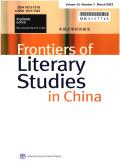莫言小说中的“虚实摇摆”思想!
IF 0.1
4区 文学
0 ASIAN STUDIES
引用次数: 0
摘要
根据杜兰和黄毓涵的说法,莫言的“艺术作品”是“世界文学中的高峰”。他的小说《四史一报》(Pow!,2012)提供了雪莱·W·陈所说的莫“后现代嬉戏”的最清晰的例子之一!莫说,这个故事“让位于在现实和幻觉之间摇摆的即兴创作”,从而暗示了“幻觉现实主义”的概念是虚幻和真实的“融合”或“融合”。这篇文章考察了这种摇摆不定的后现代故事的意识形态,也就是意识的阶级政治,对莫开玩笑地大胆断言持批评态度:“我一直为自己缺乏意识形态而自豪,尤其是在写作的时候。”!体现了马克思所说的“快乐的困惑”,重新阐明了“二合一”的“后”阶级学说本文章由计算机程序翻译,如有差异,请以英文原文为准。
The Ideology of “Swings between Reality and Illusion” in Mo Yan’s Pow!
According to Angelica Duran and Yuhan Huang, Mo Yan’s “artistic works” are “towering within the literatures of the world.” His novel Si shi yi pao ( Pow! , 2012) offers one of the clearest recent examples of what Shelley W. Chan calls Mo’s “postmodern playfulness.” In his afterword to Pow! Mo says that the story “gives way to an improvisation that swings between reality and illusion,” thus suggesting the notion of “hallucinatory realism” as a “blending” or “merging” of the illusory and the real. This article examines the ideology—that is, the class politics of consciousness—of this swingy postmodern storytelling, taking a critical view of Mo’s playfully bold assertion: “I’ve always taken pride in my lack of ideology, especially when I’m writing.” I argue that the swinginess of “imagination” in Pow! embodies what Marx calls a “happy confusion” that (re)articulates the “post”-class doctrine of “combine two into one.”
求助全文
通过发布文献求助,成功后即可免费获取论文全文。
去求助
来源期刊

Frontiers of Literary Studies in China
Multiple-
CiteScore
0.10
自引率
0.00%
发文量
360
期刊介绍:
Frontiers of Literature in China seeks to provide a forum for a broad blend of peer-reviewed academic papers of literature in order to promote communication and exchanges between litterateurs in China and abroad. It will reflect the enormous advances made in China in the field of literature in recent years. In addition, this journal also bears the mission of introducing the academic achievements on Chinese literature research to the world. The coverage will include the following main branches of literature, both theoretical and applied: ancient Chinese literature, modern Chinese literature and contemporary Chinese literature.
 求助内容:
求助内容: 应助结果提醒方式:
应助结果提醒方式:


